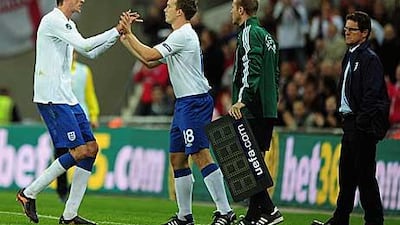Good on Kevin Davies for making his England debut the other night at the age of 33.
The result wasn't great and I left Wembley Stadium before the end because the game was atrocious, but respect to Fabio Capello, the England manager, for giving Davies a chance. It was something he earned on merit.
I only wish that the England system had been as fair when I played. Davies had deserved his chance a long time ago and I hope Capello does not just use him for just one game.
If Davies is not in his future plans, he would have better off using a young, hungry striker like Andy Carroll from Newcastle.
Davies has been playing well for Bolton Wanderers in the Premier League and benefited from injuries to Bobby Zamora, Jermain Defoe and Darren Bent, as well as Emile Heskey's decision to retire from international football.
And it's not like Peter Crouch and Wayne Rooney, the only two recognised fit strikers, didn't need a bit of competition from an older, wiser head.
His call-up gave hope to veteran players everywhere that their international dreams can still come true. Players mature at different ages and Davies is one who has got better with age. So many things can affect that, but it also works the other way.
Manchester United's Michael Owen admits that he has lost that lightning-fast pace he had as a youngster at Liverpool, the speed which saw him called up as England's youngest ever player in 1998 and skip past two Argentine defenders before scoring an amazing goal at the 1998 World Cup in France.
I am sure injuries have played their part in slowing Owen down, but then his experience of knowing when and where to make a run is better.
I was a better player at 30 than I was at 18, but while pace was an important part of my game, I did have other qualities.
Owen played with Robbie Fowler at Liverpool - another striker who burst on to the scene as a youngster. I am one of Fowler's biggest fans, although I did not see eye-to-eye with him at first. In fact we couldn't stand each other when he was at Liverpool and I was at United, but we really got on when we played together at Manchester City.
Fowler had great movement and was the best finisher of my generation until a bad knee injury knocked him for six. He gained a bit of weight and lost his sharpness, that passion to play. So he was never the same player.
At a younger age, most of the lads I played with for England schoolboys did not end up making it as professional footballers. Too many thought they had made it before they had.
We had a Vietnamese boat boy in our year and he was at Tottenham Hotspur. They were saying he was going to be unbelievable. What happened? Nothing.
Players mature at different ages for many reasons - growth, injury, confidence, training, politics and your manager. You could be the best striker at a club, but if the manager doesn't fancy you then you're nothing.
My son Devante is a striker at City. He's a good player, very raw, with pace to burn.
He is 6ft tall and has grown so quickly it's difficult for him to handle his body.
He is like a racehorse without a saddle, a wild stallion. When he puts it together everyone says "wow", when he doesn't it is clear that he's still growing. I just tell him to enjoy it and we hope that the technique will come.
But we should celebrate players who keep on going like my old United teammate Teddy Sheringham.
We were not friends, but I respect the fact that he played Premier League football until he was 40 and competitive football until 42.
Pace is usually the first thing to go with age, but Teddy's game wasn't reliant on being fast. He was all about vision and positioning, playing the right pass at the right time.
So as long as he looked after himself, he was always going to have a longer career than most.
He holds the record for being the Premier League's oldest goalscorer, for West Ham United, at nearly 41.
United's Ryan Giggs is 37 next month and still one of the best players in the world.
He's not quite got the blistering pace he had until he was 30, but his game is so much more than being quick.
He also eats well, rarely drinks and does yoga. He puts his longevity down to this. Retiring from international football helped reduce the stresses on his body and the same goes for Paul Scholes, Giggs's United teammate.
Barry Hayles was another player who got better with age after starting in non-league in West London.
He did not make it to the professional leagues until he was 25 and the Premier League when he was 28. But he had a hunger and desire which saw him keep improving. And luck. Never forget luck.
I'm 39 today and quit two years ago. Of course I wasn't as fast as when I was 20, but my decision wasn't made because I was a yard slower.
I always said that I would retire as a Premier League player and should have stuck to that. I played at the top level until I was 35 before joining Nottingham Forest who were in League One, English football's third tier.
That was a mistake. I didn't enjoy it and I was fortunate to come from a generation of players where I didn't need to play to earn money. And quitting has its advantages - instead of waking up and going training today, I can spend my birthday with my wife and family.

